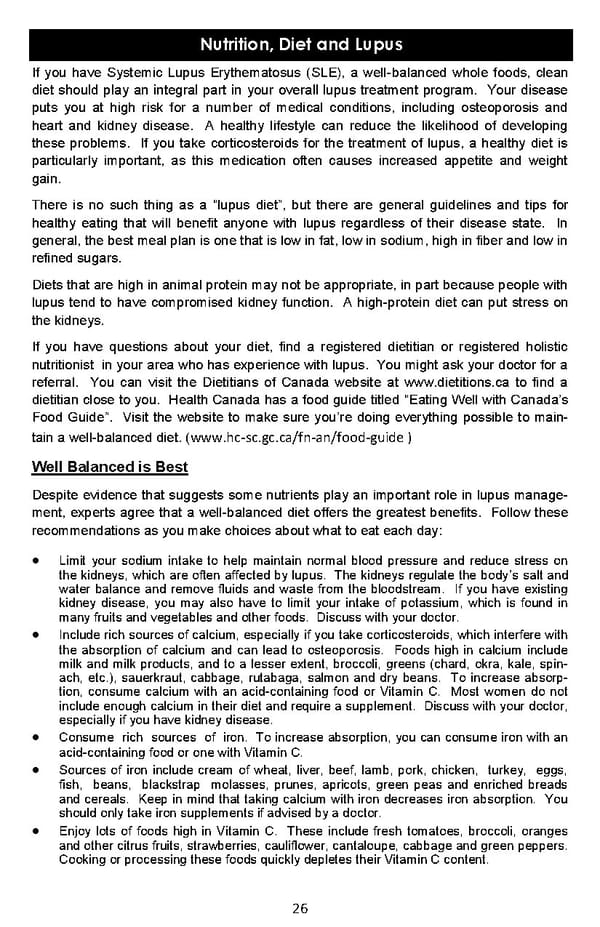Nutrition, Diet and Lupus If you have Systemic Lupus Erythematosus (SLE), a well-balanced whole foods, clean diet should play an integral part in your overall lupus treatment program. Your disease puts you at high risk for a number of medical conditions, including osteoporosis and heart and kidney disease. A healthy lifestyle can reduce the likelihood of developing these problems. If you take corticosteroids for the treatment of lupus, a healthy diet is particularly important, as this medication often causes increased appetite and weight gain. There is no such thing as a “lupus diet”, but there are general guidelines and tips for healthy eating that will benefit anyone with lupus regardless of their disease state. In general, the best meal plan is one that is low in fat, low in sodium, high in fiber and low in refined sugars. Diets that are high in animal protein may not be appropriate, in part because people with lupus tend to have compromised kidney function. A high-protein diet can put stress on the kidneys. If you have questions about your diet, find a registered dietitian or registered holistic nutritionist in your area who has experience with lupus. You might ask your doctor for a referral. You can visit the Dietitians of Canada website at www.dietitions.ca to find a dietitian close to you. Health Canada has a food guide titled “Eating Well with Canada’s Food Guide”. Visit the website to make sure you’re doing everything possible to main- tain a well-balanced diet. (www.hc-sc.gc.ca/fn-an/food-guide ) Well Balanced is Best Despite evidence that suggests some nutrients play an important role in lupus manage- ment, experts agree that a well-balanced diet offers the greatest benefits. Follow these recommendations as you make choices about what to eat each day: • Limit your sodium intake to help maintain normal blood pressure and reduce stress on the kidneys, which are often affected by lupus. The kidneys regulate the body’s salt and water balance and remove fluids and waste from the bloodstream. If you have existing kidney disease, you may also have to limit your intake of potassium, which is found in many fruits and vegetables and other foods. Discuss with your doctor. • Include rich sources of calcium, especially if you take corticosteroids, which interfere with the absorption of calcium and can lead to osteoporosis. Foods high in calcium include milk and milk products, and to a lesser extent, broccoli, greens (chard, okra, kale, spin- ach, etc.), sauerkraut, cabbage, rutabaga, salmon and dry beans. To increase absorp- tion, consume calcium with an acid-containing food or Vitamin C. Most women do not include enough calcium in their diet and require a supplement. Discuss with your doctor, especially if you have kidney disease. • Consume rich sources of iron. To increase absorption, you can consume iron with an acid-containing food or one with Vitamin C. • Sources of iron include cream of wheat, liver, beef, lamb, pork, chicken, turkey, eggs, fish, beans, blackstrap molasses, prunes, apricots, green peas and enriched breads and cereals. Keep in mind that taking calcium with iron decreases iron absorption. You should only take iron supplements if advised by a doctor. • Enjoy lots of foods high in Vitamin C. These include fresh tomatoes, broccoli, oranges and other citrus fruits, strawberries, cauliflower, cantaloupe, cabbage and green peppers. Cooking or processing these foods quickly depletes their Vitamin C content. 26
 Living Well With Lupus Facts Booklet Page 25 Page 27
Living Well With Lupus Facts Booklet Page 25 Page 27